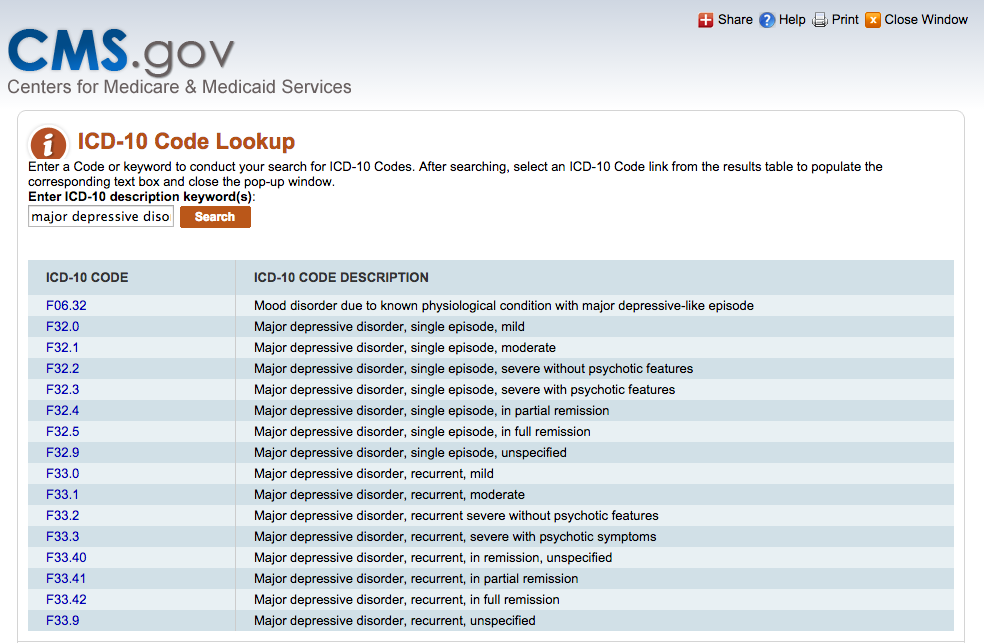(If you are not already signed up for FREE tips, news, and updates from this website, please enter your email address at the bottom of this page. Don’t miss out on this opportunity!)
The US medical system switched from ICD-9-CM to ICD-10-CM on October 1, 2015. For billing and other purposes, clinicians in the US *must* now use the ICD-10-CM codes.
ICD stands for International Classification of Diseases, the classification system developed by the World Health Organization (WHO). CM stands for Clinical Modification — the ICD modified for use in the US.
A key difference from the ICD-9-CM coding is that with ICD-10-CM, specification of subtype, severity, or other detail is usually required in order to determine the last digit of the code.
The ICD-10-CM codes for all mental disorders are given in the DSM-5. However, if you don’t have a copy, or even if you do, it is easy to look up the ICD-10-CM code for any disorder at
https://www.cms.gov/medicare-coverage-database/staticpages/icd-10-code-lookup.aspx
When you search for a DSM-5 diagnosis at that site, you will find the different codes that can be used for that category depending on subtype, severity, etc. For example, a search of the CMS site for the diagnosis of “major depressive disorder” results in the following:
Note: It is an easy method for looking up what the ICD-10 code is, but we have to enter the name of the mental disorder. Unfortunately it does not search by symptom, e.g.., “depression.” Interestingly, I tested this and part of the name of the disorder does work. E.g., “depressive,” “bipolar,” “major,” etc).
Why are all the codes not simply consecutive? That is because the diagnostic categories in ICD-10, though similar to those in DSM-5, are not exactly the same. The numbering is based on how the diagnostic categories are grouped in ICD-10 (see below on this page for how ICD-10 is organized), not on how they are grouped in DSM-5
However, in the US, we have to work the other way around: start with the DSM-5 diagnostic category and know what the ICD-10-CM code for that condition is. For example, here are the ICD-10-CM codes for a few commonly diagnosed mental disorders. (Note that ICD-10-CM codes for most, but not all, mental disorders start with the letter F. Diagnoses with codes starting with F are those that correspond to chapter 5 of ICD-10; see below)
Autism Spectrum Disorder F84.0
Attention-Deficit/Hyperactivity Disorder
Predominantly inattentive presentation F90.0
Predominantly hyperactive/impulsive presentation F90.1
Combined presentation F90.2
Generalized Anxiety Disorder F41.1
Bipolar I Disorder
Current or most recent episode manic F31.1
Current or most recent episode depressed F31.3
Bipolar II Disorder F31.81
Major Depressive Disorder
Single episode F32
Recurrent episode F33
Posttraumatic Stress Disorder F43.10
Schizophrenia F20.9
Schizoaffective Disorder
Bipolar type F25.0
Depressive type F25.1
In case you are interested, here is the basic organization of Chapter 5 of ICD-10, Mental, Behavioral and Neurodevelopmental disorders (F01-F99):
F01-F09 Mental disorders due to known physiological conditions
F10-F19 Mental and behavioral disorders due to psychoactive substance use
F20-F29 Schizophrenia, schizotypal, delusional, and other non-mood psychotic disorders
F30-F39 Mood [affective] disorders
F40-F48 Anxiety, dissociative, stress-related, somatoform and other nonpsychotic mental disorders
F50-F59 Behavioral syndromes associated with physiological disturbances and physical factors
F60-F69 Disorders of adult personality and behavior
F70-F79 Intellectual disabilities
F80-F89 Pervasive and specific developmental disorders
F90-F98 Behavioral and emotional disorders with onset usually occurring in childhood and adolescence
F99 Unspecified mental disorder
Allow us to send you occasional FREE clinically-relevant tips, updates, and news related to mental health issues by signing up below.
Your confidentiality and privacy are 100% guaranteed. We will never reveal, give, lease or sell your name or email address in any way whatsoever.
